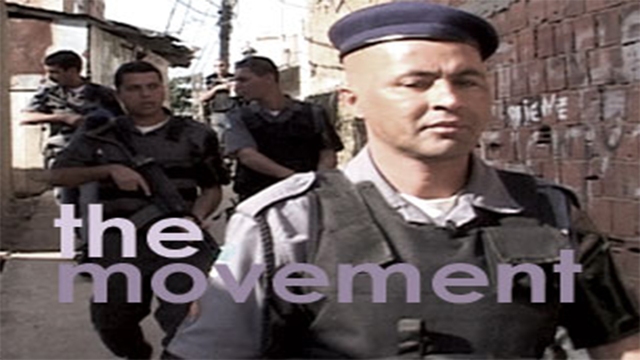The Movement
Welcome to the favelas of Rio de Janeiro: a place where everyone knows someone who has been killed.
 Welcome to the favelas of Rio de Janeiro. A place where children traffic drugs and the police murder them. Where shootouts, stray bullets and death are all daily occurrences and everyone knows someone who has been killed. This beautiful character led film captures the spirit of what it means to be Brazilian. It offers unprecedented access to the cruel world hidden in Rio de Janeiro's slums.
Welcome to the favelas of Rio de Janeiro. A place where children traffic drugs and the police murder them. Where shootouts, stray bullets and death are all daily occurrences and everyone knows someone who has been killed. This beautiful character led film captures the spirit of what it means to be Brazilian. It offers unprecedented access to the cruel world hidden in Rio de Janeiro's slums.
"I like to sniff, I like to drink, I like the street kids, my gang...." states a young boy. He can't be more than 12 but he's been living on the streets for months. Like other street children, he works the traffic lights for food and dabbles in drug trafficking. His street gang provides the family he never had.
Children are more likely to die violently in Rio de Janeiro than in war zones like Afghanistan or Sierra Leone. The city is being torn apart by an unspoken civil war as drugs lords battle each other and the police. "We all live with shoot-outs, death and stray bullets," describes teacher Yvonne Bezerro De Mello. "Children can't go to school because the school is on enemy territory."
With no education or skills, the children are sucked into a life of crime. "The traffickers are young and none of them, deep down, ever wanted to be traffickers," explains Yvonne. "They just want a different life." By sponsoring the children to attend her school, she hopes to provide them with other options. But it's a difficult ambition. Girls bunk school to work as prostitutes and students go missing for days.
"I found her by the red light district in her school uniform," says one of her colleagues sadly, gesturing at the beautiful young girl beside him. She is barely 14. "You're a pretty girl, don't do this," begs Yvonne. "It's dangerous Lilliane, it's dangerous." But in her classroom, at least, the children are safe. "This is my life programme," she states. "To improve the chaos that is our country - even a little."
Edvaldo Merrerra de Olivera also hopes to restore order and normality to the children's lives. But his job as a policeman makes it difficult for them to trust him. In 1993, a group of policeman murdered a church full of sleeping children in the infamous Candelaria massacre. Hundreds of innocent bystanders are killed by the police every year. And it's clear that many of his colleagues treat the residents of the favelas with contempt. Recently, the conflict between the drugs dealers and the police has intensified. "The situation is just getting worse," complains Yvonne. "It's a police force that hits, extorts, doesn't respect the law."
However Edvaldo is determined to overcome these obstacles and win the residents' trust. "They need to know that there are policemen they can trust who will really change their lives," he states. He works for a community police force, set up after the Canderlaria massacre to tackle crime in the Favelas. After three years of hard work, his effort is finally paying off. "People know us for the positive work we've been doing," he states proudly.
But it's not just outsiders who are trying to help the children. Fabio Campos de Oliveira and Geraldo Miranda both grew up in the favelas. Fabio is an ex-street kid while Geraldo used to traffic drugs. Now they teach circus skills to the children and put on displays to entertain them. "We try to take the kids out of their world of sniffing glue and paint stripper," he states. With their newly learned skills, the children now busk for money at traffic lights, rather than trying to rob motorists.
The problems of the Favelas have plagued Brazil for decades. Recently they've been getting worse. And it's clear that it's going to take more than the help of a few individuals to solve these deep rooted problems.
Director: Sandra Beltrao
FULL SYNOPSIS
Director: Sandra Beltrao
